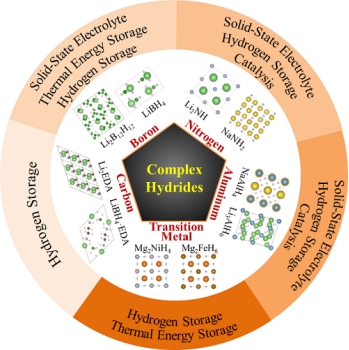Recently, Professor Chen Ping, Associate Professor He Teng, Associate Professor Cao Hujun, and other members from our group published a review article titled “Complex Hydrides for Energy Storage, Conversion and Utilization.”

Composite hydrides have high hydrogen content, a wide variety of types, and diverse properties. Since they were discovered as hydrogen storage materials in 1997, composite hydrides have been used in various fields such as energy storage, conversion, and utilization. This progress report summarizes the latest research progress in composite hydrides in hydrogen storage, heat storage, ion conduction, and catalytic conversion, systematically expounds on material design ideas, synthesis methods, and performance optimization strategies, and provides insights into the current challenges and future development directions in this research field.
Professor Chen Ping's research team is committed to studying composite hydrides for hydrogen storage and conversion. The team has developed hydrogen storage systems such as metal amides (Nature, 2002), metal aminoboranes (Nature Mater., 2008), and metal-organic compounds (Angew. Chem. Int. Ed.,2019). They have also constructed a new transition metal-alkali (earth) metal hydride catalyst system, making the low-temperature catalytic synthesis of ammonia possible (Nature Chem., 2017). Additionally, the research team explored a new chemical looping process for synthesizing ammonia using hydrides as nitrogen carriers, providing ideas for researching and developing ammonia synthesis based on renewable energy (Nature Energy, 2018).
This work was funded by the Ministry of Science and Technology, the National Natural Science Foundation of China, and our institute, and was recently published in the journal Advanced Materials. At the same time, this is also one of the articles dedicated to the 70th anniversary of our institute. (Text/Photo by He Teng and Cao Hujun)

 Home
>>
Highlights
Home
>>
Highlights